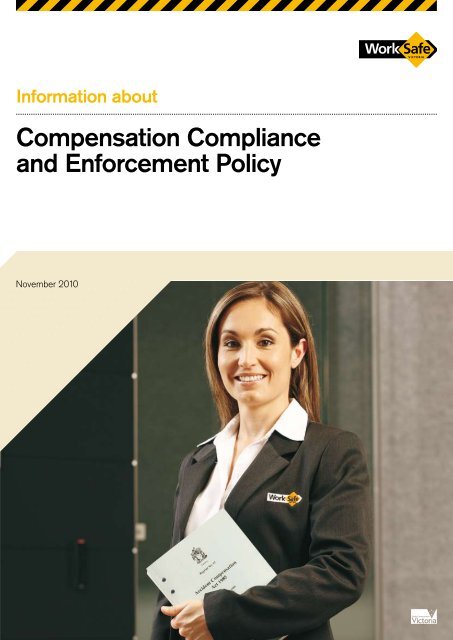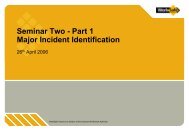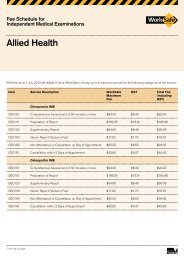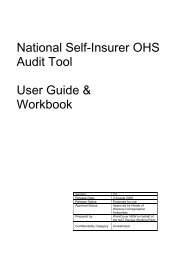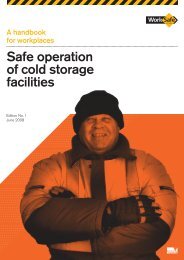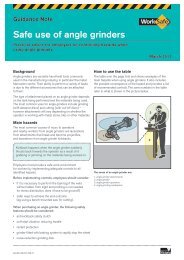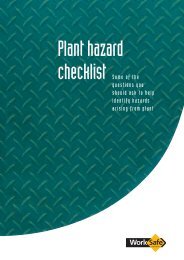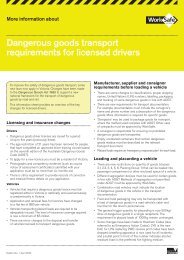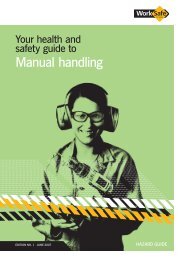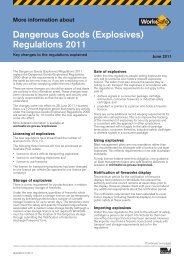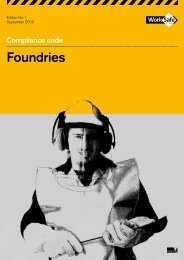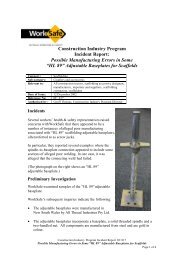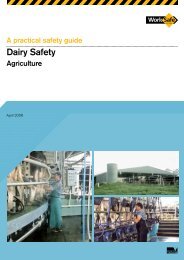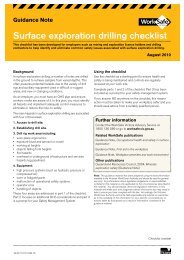Compensation Compliance and Enforcement ... - WorkSafe Victoria
Compensation Compliance and Enforcement ... - WorkSafe Victoria
Compensation Compliance and Enforcement ... - WorkSafe Victoria
You also want an ePaper? Increase the reach of your titles
YUMPU automatically turns print PDFs into web optimized ePapers that Google loves.
Information about<br />
<strong>Compensation</strong> <strong>Compliance</strong><br />
<strong>and</strong> <strong>Enforcement</strong> Policy<br />
November 2010
Contents<br />
About <strong>WorkSafe</strong> 1<br />
Our vision 1<br />
Our mission 1<br />
Our values 1<br />
<strong>Compensation</strong> <strong>Compliance</strong> <strong>and</strong> <strong>Enforcement</strong> Policy 2<br />
<strong>WorkSafe</strong>’s role 2<br />
<strong>Victoria</strong>’s accident compensation laws 2<br />
Constructive compliance approach 2<br />
Principles of enforcement 3<br />
Strategic enforcement priorities 4<br />
Detecting non-compliance 4<br />
Return to work inspections 5<br />
Audits <strong>and</strong> investigations 6<br />
Special powers relating to service providers during investigations 10<br />
<strong>Enforcement</strong> options 11<br />
Appendix – Schedule of offences 17<br />
This publication is protected by copyright.
About <strong>WorkSafe</strong><br />
Our vision<br />
<strong>Victoria</strong>n workers returning home safe every day.<br />
Our mission<br />
Working with the community to deliver outst<strong>and</strong>ing workplace safety, together<br />
with quality care <strong>and</strong> insurance protection to workers <strong>and</strong> employers.<br />
Our values<br />
The work we do is important because we impact upon many people’s lives, every day.<br />
We have a responsibility to ensure that strong values guide us in everything we do.<br />
<strong>WorkSafe</strong> <strong>Victoria</strong> is:<br />
• Constructive in the way we provide information, advice <strong>and</strong> service<br />
• Accountable for what we do <strong>and</strong> what we say. We live up to our promises<br />
• Transparent in the way we work; our environment is open <strong>and</strong> honest<br />
• Effective by working collaboratively to deliver high quality services<br />
• Caring by showing empathy in our dealings with everyone we work with.<br />
<strong>WorkSafe</strong> <strong>Victoria</strong> <strong>Compensation</strong> <strong>Compliance</strong> <strong>and</strong> <strong>Enforcement</strong> Policy 1
<strong>Compensation</strong><br />
<strong>Compliance</strong> <strong>and</strong><br />
<strong>Enforcement</strong><br />
Policy<br />
The <strong>Compensation</strong> <strong>Compliance</strong> <strong>and</strong> <strong>Enforcement</strong> Policy provides an overview<br />
of how <strong>WorkSafe</strong> monitors <strong>and</strong> enforces <strong>Victoria</strong>’s accident compensation laws<br />
<strong>and</strong> incorporates <strong>WorkSafe</strong>’s general prosecution guidelines, as published in<br />
the <strong>Victoria</strong>n Government Gazette. The guidelines are available on <strong>WorkSafe</strong>’s<br />
website, worksafe.vic.gov.au.<br />
<strong>WorkSafe</strong>’s role<br />
<strong>WorkSafe</strong> is the manager <strong>and</strong> regulator of <strong>Victoria</strong>’s workplace health <strong>and</strong> safety<br />
system <strong>and</strong> workers’ compensation scheme.<br />
<strong>WorkSafe</strong>’s overall responsibilities include:<br />
• monitoring <strong>and</strong> enforcing <strong>Victoria</strong>’s occupational health <strong>and</strong> safety laws<br />
• helping to prevent work-related deaths, injuries <strong>and</strong> disease<br />
• providing adequate <strong>and</strong> just workplace injury insurance<br />
• assisting injured workers back into the workforce<br />
• managing the workers’ compensation scheme by ensuring the prompt delivery<br />
of services <strong>and</strong> adopting prudent financial practices.<br />
This policy relates to <strong>WorkSafe</strong>’s functions of assisting <strong>and</strong> compensating injured<br />
workers in accordance with the workers’ compensation scheme.<br />
<strong>WorkSafe</strong>’s functions in relation to preventing work-related deaths injuries <strong>and</strong><br />
disease <strong>and</strong> enforcing <strong>Victoria</strong>’s occupational health <strong>and</strong> safety laws are undertaken by<br />
<strong>WorkSafe</strong>’s Health <strong>and</strong> Safety Division. More information about occupational health <strong>and</strong><br />
safety regulation is available on the <strong>WorkSafe</strong> website, worksafe.vic.gov.au.<br />
<strong>Victoria</strong>’s accident compensation laws<br />
<strong>WorkSafe</strong> administers <strong>Victoria</strong>’s accident compensation laws, which are:<br />
• Accident <strong>Compensation</strong> Act 1985 (the AC Act)<br />
• Accident <strong>Compensation</strong> (WorkCover Insurance) Act 1993 (the ACWI Act).<br />
Constructive compliance approach<br />
<strong>WorkSafe</strong> applies a strategy of ‘constructive compliance’ – a balanced combination<br />
of positive motivators <strong>and</strong> deterrents. The <strong>Victoria</strong>n community benefits both socially<br />
<strong>and</strong> financially from an effective <strong>and</strong> efficient workplace accident compensation<br />
system. Achieving this goal requires the cooperation <strong>and</strong> support of all participants<br />
in the scheme – employers, workers <strong>and</strong> service providers. Constructive compliance<br />
recognises the importance of providing all participants with comprehensive information<br />
<strong>and</strong> education about their duties <strong>and</strong> responsibilities. This strategy combines<br />
encouraging good practices with deterring unacceptable performance.<br />
2 <strong>Compensation</strong> <strong>Compliance</strong> <strong>and</strong> <strong>Enforcement</strong> Policy <strong>WorkSafe</strong> <strong>Victoria</strong>
<strong>Compensation</strong> <strong>Compliance</strong><br />
<strong>and</strong> <strong>Enforcement</strong> Policy<br />
Encouraging better performance<br />
<strong>WorkSafe</strong> encourages a more efficient <strong>and</strong> effective workers’ compensation scheme by:<br />
• communicating <strong>and</strong> engaging with stakeholders<br />
• providing practical <strong>and</strong> constructive advice <strong>and</strong> information about rights, duties <strong>and</strong><br />
responsibilities under <strong>Victoria</strong>’s accident compensation laws<br />
• fostering cooperative <strong>and</strong> consultative relationships between employers <strong>and</strong> workers<br />
• supporting <strong>and</strong> involving scheme participants in the provision <strong>and</strong> promotion<br />
of education <strong>and</strong> training<br />
• providing financial incentives for improved performance (eg the Prevention Fund<br />
<strong>and</strong> incentives under the premium system).<br />
Deterring poor performance <strong>and</strong> scheme abuse<br />
<strong>WorkSafe</strong> deters poor performance in relation to workplace injury compensation by:<br />
• detecting <strong>and</strong> investigating potential breaches of accident compensation laws<br />
• taking appropriate enforcement action in response to breaches<br />
• seeking appropriate sentencing outcomes in prosecutions<br />
• publishing information regarding the nature <strong>and</strong> outcome of enforcement actions<br />
• informing scheme participants of the nature <strong>and</strong> outcome of enforcement actions<br />
<strong>and</strong> providing advice on compliance.<br />
Principles of enforcement<br />
In addition to the values that underpin all <strong>WorkSafe</strong>’s activities, these being that all<br />
activities should be constructive, accountable, transparent <strong>and</strong> effective, the following<br />
principles apply to <strong>WorkSafe</strong>’s compliance <strong>and</strong> enforcement activities:<br />
Targeted – <strong>WorkSafe</strong> targets its activities to the areas of most need <strong>and</strong> effect.<br />
Proportionate – <strong>Enforcement</strong> action should be proportionate to the seriousness<br />
of the breach.<br />
Consistent – A consistent approach should be taken in similar situations or<br />
circumstances to achieve consistent outcomes.<br />
Fair – All compliance <strong>and</strong> enforcement activities (including decision-making)<br />
must be fair – ie undertaken with impartiality, balance <strong>and</strong> integrity. In addition,<br />
all prosecution-related activities must be undertaken in accordance with<br />
<strong>WorkSafe</strong>’s general prosecution guidelines. The guidelines are available<br />
on <strong>WorkSafe</strong>’s website, worksafe.vic.gov.au.<br />
<strong>WorkSafe</strong> <strong>Victoria</strong> <strong>Compensation</strong> <strong>Compliance</strong> <strong>and</strong> <strong>Enforcement</strong> Policy 3
<strong>Compensation</strong> <strong>Compliance</strong><br />
<strong>and</strong> <strong>Enforcement</strong> Policy<br />
Strategic enforcement priorities<br />
<strong>WorkSafe</strong> has a clear strategic focus for its compensation-related compliance<br />
<strong>and</strong> enforcement activities. <strong>WorkSafe</strong> targets the following:<br />
1. The appropriateness of the payments made to workers, employers <strong>and</strong><br />
service providers with a particular focus on dishonest behaviour <strong>and</strong> practices<br />
by workers, employers <strong>and</strong> those who provide services to injured workers.<br />
2. Failures by employers to comply with return to work obligations set out in<br />
Part VIIB of the AC Act, including to plan a worker’s return to work, to consult<br />
about a worker’s return to work <strong>and</strong> to provide employment to injured workers<br />
to the extent that it is reasonable to do so.<br />
3. Behaviours that unduly delay or complicate injured workers’ access<br />
to entitlements or appropriate treatment, such as failing to make weekly payments.<br />
4. Inappropriate use of information, especially such as inappropriate use of personal<br />
<strong>and</strong> health information about workers.<br />
5. Discrimination or threats to discriminate against workers when making or<br />
pursuing claims for compensation or giving notice of injury.<br />
6. Interference with Return to Work inspectors <strong>and</strong> other persons authorised to<br />
exercise <strong>WorkSafe</strong>’s powers.<br />
7. Breaches by private investigators of the Code of Practice for Private Investigators<br />
<strong>and</strong> surveillance legislation.<br />
8. Premium evasion <strong>and</strong> premium avoidance schemes.<br />
9. Breaches of the AC Act or contractual obligations by self-insurers.<br />
From time to time, <strong>WorkSafe</strong> will focus on other areas <strong>and</strong> will ordinarily publish this<br />
information on its website, worksafe.vic.gov.au, <strong>and</strong>/or through the media.<br />
Detecting non-compliance<br />
<strong>WorkSafe</strong> receives complaints from scheme participants <strong>and</strong> members of the public<br />
about alleged breaches of accident compensation laws. <strong>WorkSafe</strong> has a dedicated<br />
hotline for these complaints:<br />
Complaints line: (03) 9641 1051 <strong>and</strong> assessment_centre@worksafe.vic.gov.au.<br />
<strong>WorkSafe</strong> also gathers <strong>and</strong> uses data <strong>and</strong> scheme information to target particular<br />
areas of the scheme for proactive compliance reviews, in line with <strong>WorkSafe</strong>’s<br />
strategic priorities.<br />
4 <strong>Compensation</strong> <strong>Compliance</strong> <strong>and</strong> <strong>Enforcement</strong> Policy <strong>WorkSafe</strong> <strong>Victoria</strong>
<strong>Compensation</strong> <strong>Compliance</strong><br />
<strong>and</strong> <strong>Enforcement</strong> Policy<br />
Return to work inspections<br />
Return to Work (RTW) inspectors are specially trained inspectors who carry out<br />
workplace inspections to ensure employers meet their return to work obligations.<br />
RTW inspectors aim to promote <strong>and</strong> support employers <strong>and</strong> injured workers<br />
to achieve safe <strong>and</strong> sustainable return to work in the workplace. This includes<br />
promoting effective occupational rehabilitation of injured workers that leads<br />
to early, safe <strong>and</strong> sustained return to work.<br />
The role of RTW inspectors<br />
The primary role of RTW inspectors is to ensure that employers comply with the<br />
return to work part of the AC Act. They are a key part of <strong>WorkSafe</strong>’s constructive<br />
compliance strategy. Inspectors carry out their role by undertaking workplace<br />
inspections to:<br />
• assess employer compliance with return to work obligations<br />
• provide advice <strong>and</strong> education on obligations<br />
• identify where enforcement action needs to be taken.<br />
RTW inspectors also have the power to provide advice in relation to other parts<br />
of the AC Act.<br />
Actions that can be taken by RTW inspectors<br />
If return to work obligations under the AC Act are not being complied with,<br />
RTW inspectors are able to take action to enforce the law using Return to Work<br />
Improvement Notices. These are written directions requiring a person to remedy<br />
a contravention of the law within a specified time. Inspectors will reach their<br />
decision to issue a Return to Work Improvement Notice after making appropriate<br />
enquiries with the relevant workplace parties.<br />
Their decisions also take into account:<br />
• the nature <strong>and</strong> circumstances of the alleged contravention<br />
• <strong>WorkSafe</strong>’s compliance <strong>and</strong> enforcement policies.<br />
A RTW Inspector will issue a Return to Work Improvement Notice to the duty holder<br />
<strong>and</strong> copies may be provided to the employer’s <strong>WorkSafe</strong> Agent, where relevant.<br />
In the event that the notice is in relation to the return to work of a particular worker,<br />
a copy of the notice will also be provided to that worker by the inspector.<br />
Further investigation of contraventions may also be undertaken by <strong>WorkSafe</strong> to<br />
determine whether the contravention of the AC Act warrants prosecution or some<br />
other form of enforcement action. This includes circumstances where the employer<br />
has failed to comply with an improvement notice issued by a RTW inspector.<br />
<strong>WorkSafe</strong> <strong>Victoria</strong> <strong>Compensation</strong> <strong>Compliance</strong> <strong>and</strong> <strong>Enforcement</strong> Policy 5
<strong>Compensation</strong> <strong>Compliance</strong><br />
<strong>and</strong> <strong>Enforcement</strong> Policy<br />
Workplace visits<br />
RTW inspectors visit workplaces for a number of different reasons. Most visits relate<br />
to workplaces where a worker with a workers’ compensation claim has been unable<br />
to return to work. Particular priority is given to visiting those workplaces where a<br />
worker has been certified by their treating health practitioner as having a capacity<br />
for work, but has not yet been offered suitable employment, where the employer<br />
may have a legal obligation to provide the worker with such employment. Inspectors<br />
will also attend workplaces in response to a complaint that an employer is not<br />
complying with their legal obligations under the AC Act.<br />
Approach to workplace visits<br />
Once a workplace has been identified for a visit, a RTW inspector will normally<br />
contact the employer indicating that a visit will be made to their workplace. If the visit<br />
involves a particular injured worker’s claim, the inspector will also contact the injured<br />
worker to give them an opportunity to provide feedback on their return to work.<br />
If the injured worker is back at work, the inspector will ask to speak to the injured<br />
worker during the visit.<br />
An employer can request the presence of a representative (eg workers’<br />
compensation consultant) or their Agent at a visit by an inspector. Injured workers<br />
can also have a representative or support person present during discussions, such<br />
as a union representative, their health <strong>and</strong> safety representative, a family member<br />
or work colleague.<br />
Following a visit, the RTW inspector will provide the employer with a report about<br />
the inspector’s observations during the visit <strong>and</strong> any enforcement action taken.<br />
The inspector may also provide a copy of the entry report to any workers whose<br />
claims were looked at during the visit <strong>and</strong> the relevant <strong>WorkSafe</strong> Agent.<br />
Audits <strong>and</strong> investigations<br />
An audit or investigation may be triggered by information <strong>WorkSafe</strong> obtains through<br />
a complaint or through <strong>WorkSafe</strong>’s proactive activities (eg a review of payments to<br />
a group of health service providers or visits to workplaces by RTW inspectors).<br />
Notifying <strong>Victoria</strong> Police of investigations<br />
<strong>WorkSafe</strong> must notify the Chief Commissioner of <strong>Victoria</strong> Police of an inquiry or<br />
investigation into offences under sections 248 (fraud), 248AA (bribery), 248A<br />
(false or misleading information by a professional service provider) or 249 (false<br />
information) of the AC Act, where <strong>WorkSafe</strong> reasonably believes that an offence<br />
was or may have been committed. Before notifying the Chief Commissioner of an<br />
inquiry or investigation, <strong>WorkSafe</strong> must have sufficient information or evidence on<br />
which to base a reasonable belief that an offence was or may have been committed.<br />
6 <strong>Compensation</strong> <strong>Compliance</strong> <strong>and</strong> <strong>Enforcement</strong> Policy <strong>WorkSafe</strong> <strong>Victoria</strong>
<strong>Compensation</strong> <strong>Compliance</strong><br />
<strong>and</strong> <strong>Enforcement</strong> Policy<br />
Investigative powers<br />
<strong>WorkSafe</strong> has various powers to obtain information <strong>and</strong> evidence under the AC Act.<br />
These are:<br />
• the power to obtain information <strong>and</strong> evidence<br />
• the power to inspect premises<br />
• the power to apply to a magistrate for a warrant for police to search premises.<br />
<strong>WorkSafe</strong> also has RTW inspectors dedicated to monitoring <strong>and</strong> enforcing return<br />
to work obligations. (More information about RTW inspectors <strong>and</strong> their powers is<br />
on page 5.)<br />
Obtaining information<br />
<strong>WorkSafe</strong> may issue a notice requiring any person to provide information or attend<br />
<strong>and</strong> give evidence or to produce all ‘books’ in their custody or control (section 239,<br />
AC Act). ‘Books’ means ‘any register or other record of information <strong>and</strong> any accounts<br />
or accounting records, however compiled, recorded or stored, <strong>and</strong> also includes any<br />
document’.<br />
Inspecting premises<br />
<strong>WorkSafe</strong> has the power to enter, inspect <strong>and</strong> examine any premises <strong>and</strong> to<br />
require a person at the premises to give information <strong>and</strong> produce books to determine<br />
whether there has been a contravention of the AC Act or the ACWI Act or to enforce<br />
either Act. <strong>WorkSafe</strong> may only exercise its power to inspect at a reasonable time,<br />
which is usually during the normal operating hours of the business in question<br />
(section 241, AC Act*).<br />
Interference with the exercise of powers<br />
It is an offence under section 241 of the AC Act for a person to:<br />
• obstruct or hinder a person exercising powers under section 239 or 240, or<br />
• without reasonable excuse, fail or refuse to comply with a notice issued pursuant<br />
to section 239 or 240, or<br />
• assault, intimidate or threaten (or attempt to assault, intimidate or threaten)<br />
a person exercising powers under section 239 or 240.<br />
* Note: A similar power to obtain information from employers is also contained within section 60 of the ACWI Act.<br />
<strong>WorkSafe</strong> <strong>Victoria</strong> <strong>Compensation</strong> <strong>Compliance</strong> <strong>and</strong> <strong>Enforcement</strong> Policy 7
<strong>Compensation</strong> <strong>Compliance</strong><br />
<strong>and</strong> <strong>Enforcement</strong> Policy<br />
Search Warrants<br />
<strong>WorkSafe</strong> may apply to a magistrate for a warrant to search premises under<br />
section 240A of the AC Act*. The magistrate may grant the search warrant if<br />
there are reasonable grounds to believe there are any books on the premises that<br />
are relevant to determining whether any of the provisions of the AC Act are being<br />
or have been contravened. It is an offence under section 240A(4) for a person to<br />
obstruct or hinder, oppose or refuse to permit such a search or seizure, or to assault<br />
or attempt to assault a person employed or acting in the execution or under the<br />
authority of a warrant.<br />
The following circumstances are examples of when <strong>WorkSafe</strong> may apply for<br />
a search warrant:<br />
• <strong>WorkSafe</strong> believes that evidence may be destroyed, removed, altered or hidden.<br />
• <strong>WorkSafe</strong> has issued a notice pursuant to section 239 or made a requirement<br />
under section 240 to provide information or produce a document, <strong>and</strong>:<br />
– the notice or requirement has not been complied with, <strong>and</strong>/or<br />
– the production of the information or document has been refused, <strong>and</strong>/or<br />
– the existence of the document sought has been denied, <strong>and</strong>/or<br />
– <strong>WorkSafe</strong> suspects that such a notice or requirement will be ineffective in<br />
obtaining the information required.<br />
• The information or document is in the possession or control of a person who<br />
may be incriminated in relation to the offence under investigation if required<br />
to produce information under section 239 or 240 of the AC Act.<br />
• A person has denied the existence of evidence where there are reasonable<br />
grounds to believe it does exist.<br />
Recorded interviews<br />
<strong>WorkSafe</strong> investigators may invite a person to attend a recorded interview regarding<br />
an allegation or suspicion that the person has breached accident compensation<br />
laws. <strong>WorkSafe</strong> will also arrange for an interpreter to be present if needed in such<br />
interviews. There are always two investigators present during an interview to ensure<br />
that there can be corroboration of what occurs.<br />
All interviews are recorded <strong>and</strong> the investigators always provide the interviewee with<br />
a copy of the CD of interview within seven days. In addition, or as an alternative to<br />
attending a formal recorded interview, a person can provide <strong>WorkSafe</strong> with written<br />
submissions, evidence or documents that they wish <strong>WorkSafe</strong> to consider.<br />
Legal assistance<br />
A person under investigation is entitled to seek legal advice <strong>and</strong> to have their lawyer<br />
or an independent person who is not connected with the investigation present<br />
during an interview with <strong>WorkSafe</strong> investigators.<br />
* Note: A similar power to apply for the issue of a search warrant is contained in section 70 of the ACWI Act.<br />
8 <strong>Compensation</strong> <strong>Compliance</strong> <strong>and</strong> <strong>Enforcement</strong> Policy <strong>WorkSafe</strong> <strong>Victoria</strong>
<strong>Compensation</strong> <strong>Compliance</strong><br />
<strong>and</strong> <strong>Enforcement</strong> Policy<br />
Use of information obtained<br />
Any information obtained pursuant to section 239, 240 or 240A is subject to the<br />
secrecy provisions contained in section 243 of the AC Act, which prevent <strong>WorkSafe</strong><br />
employees from using the information obtained for anything other than official<br />
duties or the performance of their functions or powers. The secrecy provisions do<br />
not prevent <strong>WorkSafe</strong> employees from disclosing information for a range of other<br />
reasons set out in section 243(2), such as production of documents to a court in<br />
the course of criminal proceedings or providing documents or information to other<br />
government agencies, including the Transport Accident Commission.<br />
Client legal privilege<br />
A person may be able to claim client legal privilege in relation to certain information<br />
as a reasonable excuse not to comply with their usual duty to provide information or<br />
evidence to <strong>WorkSafe</strong> under sections 239, 240 <strong>and</strong> 240A of the AC Act. <strong>WorkSafe</strong><br />
accepts that its powers are subject to a valid claim of legal professional privilege <strong>and</strong><br />
is committed to exercising its powers in a fair <strong>and</strong> lawful way.<br />
<strong>WorkSafe</strong> investigators will give any person subject to a section 239 notice,<br />
inspection under section 240 or a search warrant reasonable time to seek legal<br />
advice (or in the case of a solicitor or barrister, to seek instructions) in relation to<br />
making a claim of privilege. A claim of client legal privilege must be made by the<br />
person being asked to provide the information or his or her legal adviser.<br />
If a claim of client legal privilege is made, <strong>WorkSafe</strong> will seek written confirmation of:<br />
• the claim for privilege<br />
• the documents over which privilege is claimed<br />
• the basis for the claim.<br />
If <strong>WorkSafe</strong> believes the claim is not a valid claim for client legal privilege,<br />
<strong>WorkSafe</strong> may take the following action:<br />
• provide a response to the person making the claim <strong>and</strong> explain any<br />
proposed action<br />
• look for the information elsewhere<br />
• challenge the claim of privilege in court, <strong>and</strong>/or<br />
• apply for a warrant to search for <strong>and</strong> seize the document <strong>and</strong> deliver it to<br />
a court to decide.<br />
Once <strong>WorkSafe</strong> is aware that a document is subject to a claim of client<br />
legal privilege, <strong>WorkSafe</strong> will:<br />
• not look at the contents of the document<br />
• deliver the document to the court that issued the warrant<br />
• abide by the decision of the court in relation to the claim of privilege.<br />
<strong>WorkSafe</strong> <strong>Victoria</strong> <strong>Compensation</strong> <strong>Compliance</strong> <strong>and</strong> <strong>Enforcement</strong> Policy 9
<strong>Compensation</strong> <strong>Compliance</strong><br />
<strong>and</strong> <strong>Enforcement</strong> Policy<br />
Special powers relating to service providers<br />
during investigations<br />
If <strong>WorkSafe</strong> reasonably suspects that a service provider (eg. a health care provider)<br />
has committed an offence against the AC Act or an offence against the Crimes Act<br />
1958 in connection with a claim for compensation, <strong>WorkSafe</strong> can suspend payments<br />
to the service provider. Suspensions remain in force until:<br />
• the prosecution is completed, or<br />
• where no prosecution is commenced, when <strong>WorkSafe</strong> decides not to prosecute for<br />
the suspected offence or after six months (whichever occurs first).<br />
Before suspending payments, <strong>WorkSafe</strong> must give the service provider written notice<br />
of the proposed suspension <strong>and</strong> invite the service provider to make any submissions<br />
within 28 days as to why the suspension should not be imposed.<br />
In determining whether to suspend payments pending an investigation <strong>and</strong>/or<br />
prosecution, <strong>WorkSafe</strong> takes into account the circumstances of each individual case,<br />
including the following considerations:<br />
• the seriousness of the suspected offence <strong>and</strong> the strength of the evidence<br />
upon which the suspicions are based<br />
• the perceived risk to injured workers or the scheme associated with continuing<br />
to pay the provider for services pending the finalisation of the investigation<br />
<strong>and</strong>/or prosecution<br />
• the need to maintain stakeholder <strong>and</strong> community confidence in the scheme<br />
• the proportionality <strong>and</strong> fairness of the suspension in the particular case<br />
• the impact that any suspension will have on the service provider <strong>and</strong> any potential<br />
‘flow on’ impacts to others<br />
• whether there are less burdensome alternatives to suspension to protect injured<br />
workers <strong>and</strong> the scheme<br />
• the level of cooperation provided by the provider during <strong>WorkSafe</strong>’s inquiries<br />
• any remedial steps taken by the provider with respect to <strong>WorkSafe</strong>’s concerns<br />
• any other enforcement action that is likely to be taken against the service provider<br />
• any submissions made by the provider as to why the suspension should not<br />
be imposed.<br />
Providers can seek a review of <strong>WorkSafe</strong>’s decision to suspend payments through<br />
the <strong>Victoria</strong>n Civil <strong>and</strong> Administrative Tribunal.<br />
If the service provider is subsequently convicted or found guilty of an offence<br />
against the AC Act, the court may order that any costs for services rendered<br />
during the period of the suspension are not payable. The court may also:<br />
• disqualify the provider from the scheme for a specified period<br />
• revoke the provider’s approval (where applicable) to provide services<br />
• preclude the provider from re-applying for approval for a specified period.<br />
10 <strong>Compensation</strong> <strong>Compliance</strong> <strong>and</strong> <strong>Enforcement</strong> Policy <strong>WorkSafe</strong> <strong>Victoria</strong>
<strong>Compensation</strong> <strong>Compliance</strong><br />
<strong>and</strong> <strong>Enforcement</strong> Policy<br />
<strong>Enforcement</strong> options<br />
<strong>WorkSafe</strong> determines the most appropriate enforcement tool to be used in<br />
accordance with <strong>WorkSafe</strong>’s general prosecution guidelines. The guidelines are<br />
available on <strong>WorkSafe</strong>’s website, worksafe.vic.gov.au.<br />
Depending on the type of breach, the following enforcement options are<br />
available to <strong>WorkSafe</strong>:<br />
• commencing a prosecution<br />
• accepting an enforceable undertaking<br />
• issuing a letter of caution<br />
• seeking reimbursement or taking civil (rather than criminal) action<br />
• revoking, suspending or cancelling permissions (eg approvals, authorisations)<br />
• referring matters to professional, registration or disciplinary bodies or<br />
other agencies<br />
• disqualifying service providers from the scheme<br />
• terminating weekly payments<br />
• applying administrative penalties<br />
• seeking voluntary compliance.<br />
Prosecution<br />
Where sufficient admissible evidence exists of a breach of compensation laws<br />
<strong>and</strong> a prosecution would be in the public interest, <strong>WorkSafe</strong> will commence <strong>and</strong><br />
conduct the prosecution in accordance with its general prosecution guidelines.<br />
The guidelines are available on <strong>WorkSafe</strong>’s website, worksafe.vic.gov.au.<br />
<strong>WorkSafe</strong> can prosecute offences under the AC Act, the ACWI Act <strong>and</strong> offences<br />
under the Crimes Act 1958 that are connected with a claim for compensation.<br />
A schedule setting out the detail of each offence that <strong>WorkSafe</strong> may prosecute<br />
<strong>and</strong> the maximum penalty that applies to each offence can be found in the<br />
Appendix (see page 16).<br />
In relation to most offences, the time for <strong>WorkSafe</strong> to bring charges against a<br />
person for an offence is limited. In relation to some offences, charges must be<br />
brought within the time period contained in the legislation where the offence is<br />
set out. Where an offence does not have a time limit stipulated in the legislation,<br />
then the time limit depends on the nature of the charge.<br />
Where a prosecution has been commenced, <strong>WorkSafe</strong> may negotiate with<br />
the alleged offender in relation to:<br />
• which charge(s) among multiple available charges will be pursued<br />
• whether one or more charges may be withdrawn if the accused person<br />
pleads guilty to a particular charge or charges, thereby removing the need<br />
for a contested hearing<br />
• the summary of the offence(s) that will be presented to the court in cases<br />
where the accused person pleads guilty<br />
• what parts of the evidence or elements of a charge are agreed between the<br />
prosecution <strong>and</strong> defence, in order to narrow the issues in dispute <strong>and</strong> reduce<br />
the length of contested hearings.<br />
<strong>WorkSafe</strong> can also seek a refund of money from offenders under section<br />
249A of the AC Act following a finding of guilt by a court of an offence under<br />
the AC Act or an offence under the Crimes Act 1958 that is connected with<br />
a claim for compensation.<br />
<strong>WorkSafe</strong> <strong>Victoria</strong> <strong>Compensation</strong> <strong>Compliance</strong> <strong>and</strong> <strong>Enforcement</strong> Policy 11
<strong>Compensation</strong> <strong>Compliance</strong><br />
<strong>and</strong> <strong>Enforcement</strong> Policy<br />
Enforceable undertakings<br />
As an alternative to prosecution, <strong>WorkSafe</strong> may accept a written undertaking by a<br />
person in connection with a contravention (or alleged contravention) of the AC Act.<br />
Once <strong>WorkSafe</strong> accepts an enforceable undertaking, <strong>WorkSafe</strong> cannot prosecute<br />
the person for the offence.<br />
If <strong>WorkSafe</strong> considers that the undertaking has been breached, <strong>WorkSafe</strong> may<br />
apply to the Magistrates’ Court of <strong>Victoria</strong> for enforcement of the undertaking. If the<br />
Magistrates’ Court is satisfied that the undertaking has been breached, the court may:<br />
• make an order that the person must comply with the undertaking<br />
• make an order that the person take specified action, or<br />
• make any other order it considers appropriate.<br />
The undertaking may be withdrawn or varied only with the consent of <strong>WorkSafe</strong>.<br />
Letters of caution<br />
<strong>WorkSafe</strong> may issue a letter of caution as an alternative to prosecution. A letter<br />
of caution gives notice to an alleged offender that <strong>WorkSafe</strong> has detected a breach<br />
of <strong>Victoria</strong>’s accident compensation laws which it could prosecute, but that after<br />
consideration of <strong>WorkSafe</strong>’s general prosecution guidelines, it will not prosecute for<br />
the breach.<br />
<strong>WorkSafe</strong> will generally issue a letter of caution where:<br />
• there is sufficient evidence of the breach<br />
• it is a relatively minor breach<br />
• some form of enforcement action is warranted but in all the circumstances,<br />
it is not in the public interest to prosecute the breach.<br />
A previous letter of caution may be taken into account by <strong>WorkSafe</strong> in deciding<br />
whether to prosecute any subsequent offence for a similar contravention. <strong>WorkSafe</strong><br />
will not use a previous letter of caution during prosecution or sentencing for<br />
subsequent offending (unless the offender asserts that they have not previously<br />
breached the law).<br />
Seeking reimbursement <strong>and</strong> civil action<br />
Pursuing recovery of inappropriate payments or overpayments is an important<br />
part of <strong>WorkSafe</strong>’s role in protecting the financial viability of the scheme <strong>and</strong><br />
discouraging abuse.<br />
<strong>WorkSafe</strong> may pursue civil action where there is insufficient evidence to bring a<br />
criminal charge or the relevant circumstances do not give rise to any offence under<br />
accident compensation laws. Civil action involves <strong>WorkSafe</strong> suing a person for<br />
a remedy (usually the payment of money) whereas criminal prosecution involves<br />
<strong>WorkSafe</strong> asking the court to impose a criminal punishment upon making a finding<br />
of guilt. Criminal charges must be proved ‘beyond reasonable doubt’, whereas civil<br />
causes of action must be proved only ‘on the balance of probabilities’.<br />
<strong>WorkSafe</strong> carefully considers the appropriate timing of civil action where criminal<br />
action is contemplated <strong>and</strong> may delay bringing any civil case until criminal<br />
proceedings are concluded or at the point in time when it has decided not<br />
to prosecute a case.<br />
12 <strong>Compensation</strong> <strong>Compliance</strong> <strong>and</strong> <strong>Enforcement</strong> Policy <strong>WorkSafe</strong> <strong>Victoria</strong>
<strong>Compensation</strong> <strong>Compliance</strong><br />
<strong>and</strong> <strong>Enforcement</strong> Policy<br />
Revocation, suspension or cancellation of permissions<br />
<strong>WorkSafe</strong> authorises <strong>and</strong> permits certain people to do certain things for the purposes<br />
of the scheme. For example, <strong>WorkSafe</strong> approves certain appropriately qualified<br />
healthcare providers to provide services to injured workers.<br />
Subject to legal requirements, <strong>WorkSafe</strong> may decide to revoke, suspend or cancel<br />
any authorisation or permission given to a person in order to deal with behaviours<br />
or practices identified in its investigation or audit. Such action is a protective<br />
measure <strong>and</strong> may be undertaken even where steps have been taken to remedy<br />
a contravention or where an offender has been otherwise punished (eg fined<br />
or imprisoned).<br />
<strong>WorkSafe</strong> recognises that the revocation, suspension or cancellation of regulatory<br />
permissions may have serious consequences for the permission holder <strong>and</strong> may also<br />
have serious adverse ‘flow on’ effects. When making decisions about permissions,<br />
<strong>WorkSafe</strong> balances these considerations with the paramount need to protect injured<br />
workers <strong>and</strong> the scheme. In making a decision whether or not to issue or renew a<br />
regulatory permission, <strong>WorkSafe</strong> will consider the person’s history of compliance.<br />
Referral to professional bodies<br />
If <strong>WorkSafe</strong> is concerned about the adequacy, appropriateness or frequency of<br />
any services provided to injured workers, <strong>WorkSafe</strong> may refer its concerns to the<br />
professional body regulating the service provider (section 249B of the AC Act).<br />
Where the service provider is not regulated by a professional body, <strong>WorkSafe</strong><br />
may carry out its own enquiries to determine whether there has been any<br />
improper conduct.<br />
<strong>WorkSafe</strong> may suspend any payments to the person pending the outcome of the<br />
professional body’s review or <strong>WorkSafe</strong>’s review (as the case may be). Before<br />
suspending payments, <strong>WorkSafe</strong> must give the provider written notice of the<br />
proposed suspension <strong>and</strong> invite the provider to make any submissions within<br />
28 days as to why the suspension should not be imposed.<br />
In determining whether to suspend payments pending review, <strong>WorkSafe</strong> takes into<br />
account the circumstances of each individual case, including the following:<br />
• the seriousness of the alleged concerns <strong>and</strong> the strength of the evidence upon<br />
which the concerns are based<br />
• the perceived risk to injured workers or the scheme associated with continuing<br />
to pay the provider for services pending the review of the provider’s conduct<br />
• the need to maintain stakeholder <strong>and</strong> community confidence in the scheme<br />
• the proportionality <strong>and</strong> fairness of a suspension in the particular case<br />
• the impact that any suspension will have on the service provider, <strong>and</strong> any potential<br />
‘flow on’ impacts to others<br />
• whether there are less burdensome alternatives to suspension to protect injured<br />
workers <strong>and</strong> the scheme<br />
• the level of cooperation by the provider during <strong>WorkSafe</strong>’s inquiries<br />
• any remedial steps taken by the provider with respect to <strong>WorkSafe</strong>’s concerns<br />
• any other enforcement action that is likely to be taken against the service provider<br />
• any submissions made by the provider as to why the suspension should<br />
not be imposed.<br />
<strong>WorkSafe</strong> <strong>Victoria</strong> <strong>Compensation</strong> <strong>Compliance</strong> <strong>and</strong> <strong>Enforcement</strong> Policy 13
<strong>Compensation</strong> <strong>Compliance</strong><br />
<strong>and</strong> <strong>Enforcement</strong> Policy<br />
A suspension of payments does not mean that the service provider cannot provide<br />
services to injured workers during the period of the suspension. However, the service<br />
provider will not be paid for any services rendered to injured workers during the<br />
suspension period. Suspensions stay in place until the completion of the professional<br />
body’s or <strong>WorkSafe</strong>’s review (as the case may be). Providers can seek a review of<br />
<strong>WorkSafe</strong>’s decision to suspend payments through the <strong>Victoria</strong>n Civil <strong>and</strong><br />
Administrative Tribunal.<br />
Disqualifications<br />
<strong>WorkSafe</strong> can effectively disqualify a service provider from the scheme for a<br />
specified period if the service provider:<br />
• is convicted or found guilty of an offence punishable by imprisonment for a term<br />
of two years or more or by a maximum fine of not less than 240 penalty units<br />
• is convicted or found guilty of an offence punishable by imprisonment<br />
for a term of two years or more under a law of another state, a territory<br />
or the Commonwealth.<br />
<strong>WorkSafe</strong> can also disqualify a service provider from the scheme for a specified<br />
period if a professional body finds, or considers on reasonable grounds, that:<br />
• the service provider has engaged in unprofessional conduct or professional<br />
misconduct, or<br />
• the ability of a service provider to practise is affected because of the<br />
person’s physical or mental health or the person’s incapacity, or<br />
• the service provider is not of good character or is otherwise not a fit<br />
<strong>and</strong> proper person.<br />
Before suspending payments, <strong>WorkSafe</strong> must give the provider written notice<br />
of the proposed disqualification <strong>and</strong> invite the provider to make any submissions<br />
within 28 days as to why the disqualification should not be imposed.<br />
In determining whether to disqualify a service provider from the scheme, <strong>WorkSafe</strong><br />
takes into account the circumstances of each individual case, including the types of<br />
considerations referred to in relation to referrals <strong>and</strong> suspensions. <strong>WorkSafe</strong> gives<br />
notice of disqualifications to the professional body that regulates the conduct of<br />
the service provider (where one exists) <strong>and</strong> Medicare Australia. Providers can seek<br />
a review of <strong>WorkSafe</strong>’s disqualification decisions through the <strong>Victoria</strong>n Civil <strong>and</strong><br />
Administrative Tribunal.<br />
14 <strong>Compensation</strong> <strong>Compliance</strong> <strong>and</strong> <strong>Enforcement</strong> Policy <strong>WorkSafe</strong> <strong>Victoria</strong>
<strong>Compensation</strong> <strong>Compliance</strong><br />
<strong>and</strong> <strong>Enforcement</strong> Policy<br />
Termination of weekly payments <strong>and</strong> medical services<br />
If <strong>WorkSafe</strong> is satisfied that a worker has fraudulently obtained weekly payments<br />
<strong>and</strong>/or medical <strong>and</strong> like services, <strong>WorkSafe</strong> may terminate those payments (section<br />
114(3) <strong>and</strong> 99AE AC Act). In determining whether termination of weekly payments<br />
<strong>and</strong>/or medical <strong>and</strong> like services for fraud is appropriate, <strong>WorkSafe</strong> considers all the<br />
circumstances of the individual case, including:<br />
• the strength of the evidence of the worker’s fraud<br />
• the nature, extent <strong>and</strong> seriousness of the worker’s fraud<br />
• the level of cooperation provided by the worker during <strong>WorkSafe</strong>’s inquiries<br />
• any restitution made (or genuine offer of restitution)<br />
• the prior history of the worker<br />
• the impact of termination of weekly payments on the worker, <strong>and</strong> any ‘flow on’<br />
impact on others<br />
• the proportionality of termination of weekly payments in response to the fraud<br />
• the fairness of termination in the particular case<br />
• any other enforcement action that is likely to be taken against the worker<br />
for the fraud.<br />
Administrative penalties<br />
Employers must forward all claims for compensation together with any related<br />
Certificate of Capacity to <strong>WorkSafe</strong> (except for medical expense claims which have<br />
been accepted by the employer <strong>and</strong> are within the employer’s excess) within 10 days<br />
of receiving the claim. It is an offence not to comply with this requirement. In addition<br />
to any penalty under the Act, an employer may also be held liable for any weekly<br />
payments of compensation owed to a worker until the claim <strong>and</strong> certificate are<br />
received by <strong>WorkSafe</strong>’s Agents, unless the employer can demonstrate that there<br />
was ‘reasonable cause’ for the delay. This is in addition to the employer’s excess<br />
under section 125A of the AC Act.<br />
Employers who fail to obtain or keep in force a <strong>WorkSafe</strong> injury insurance policy<br />
may also be liable for a penalty of an amount up to twice the amount of the premium<br />
that would have been payable under the policy.<br />
Voluntary compliance<br />
If <strong>WorkSafe</strong> is satisfied that a person has taken timely <strong>and</strong> satisfactory steps to<br />
remedy a detected breach, <strong>WorkSafe</strong> may, after considering the factors set out in<br />
its general prosecution guidelines <strong>and</strong> this policy, decide to take no further action.<br />
<strong>WorkSafe</strong> <strong>Victoria</strong> <strong>Compensation</strong> <strong>Compliance</strong> <strong>and</strong> <strong>Enforcement</strong> Policy 15
<strong>Compensation</strong> <strong>Compliance</strong><br />
<strong>and</strong> <strong>Enforcement</strong> Policy<br />
Publication of enforcement actions <strong>and</strong> outcomes<br />
<strong>WorkSafe</strong> publicises information about its enforcement actions in order to raise<br />
awareness of accident compensation laws <strong>and</strong> the consequence of non-compliance,<br />
thereby deterring people from engaging in similar conduct.<br />
<strong>WorkSafe</strong> may publicise information about prosecutions for example by:<br />
• summarising the case on its website<br />
• speaking to the media <strong>and</strong> sending press releases about a case<br />
• using a case as a teaching tool at seminars, conferences <strong>and</strong> in materials<br />
distributed to various groups, such as employers, employer groups <strong>and</strong><br />
trade unions<br />
• using information about a case in <strong>WorkSafe</strong> publications<br />
• using information from a case to gather <strong>and</strong> publish data <strong>and</strong> statistics.<br />
The amount of information disclosed by <strong>WorkSafe</strong> depends on the stage of the<br />
investigation <strong>and</strong> prosecution. At the start of an investigation, <strong>WorkSafe</strong> may confirm<br />
that an investigation has commenced, but will usually not make further comment<br />
on the specific facts. Once <strong>WorkSafe</strong> has laid charges <strong>and</strong> throughout any court<br />
proceedings or trial, <strong>WorkSafe</strong> generally confines its comments about the case<br />
to sending out information that is in the public interest through media releases.<br />
Upon a finding of guilt by a court in relation to breaches of accident compensation<br />
laws, <strong>WorkSafe</strong> usually publishes a summary of the case on its website, including<br />
identifying details, <strong>and</strong> may also disclose information about the outcome in<br />
communications to the media, in <strong>WorkSafe</strong> publications <strong>and</strong> in seminars, conferences<br />
<strong>and</strong> other materials. If a person is found not guilty or <strong>WorkSafe</strong> withdraws charges,<br />
<strong>WorkSafe</strong> generally limits disclosure about the case to information that is already in<br />
the public domain as a result of the prosecution process <strong>and</strong> where there is a clear<br />
public interest in disclosure of the information. <strong>WorkSafe</strong> may speak publicly about<br />
the proceedings at the request of the person found not guilty to clarify the status<br />
of proceedings.<br />
At all times, <strong>WorkSafe</strong> aims to be accurate, impartial, balanced <strong>and</strong> fair in the way it<br />
communicates about investigations <strong>and</strong> prosecutions. At any stage of the investigation<br />
<strong>and</strong> prosecution process, <strong>WorkSafe</strong> may disseminate information in relation to a<br />
case for the purpose of preventing similar offences from occurring. <strong>WorkSafe</strong> may<br />
also disclose information about a case to the public at any time where it considers<br />
it is necessary to quell speculation or to correct or forestall inaccurate media reports.<br />
<strong>WorkSafe</strong> may publish identifying information about a case in relation to enforceable<br />
undertakings accepted or letters of caution issued in lieu of a prosecution. <strong>WorkSafe</strong><br />
also publishes on its website the details of disqualifications <strong>and</strong> suspensions,<br />
including the names <strong>and</strong> business addresses of service providers who have been<br />
disqualified or suspended.<br />
16 <strong>Compensation</strong> <strong>Compliance</strong> <strong>and</strong> <strong>Enforcement</strong> Policy <strong>WorkSafe</strong> <strong>Victoria</strong>
Appendix –<br />
Schedule<br />
of offences<br />
Accident <strong>Compensation</strong> Act 1985 (AC Act)<br />
The AC Act contains a number of offences for failing to comply with certain<br />
provisions of the Act. These offences are set out in the following table.<br />
Offence<br />
Section<br />
Offence Description<br />
Penalty<br />
56(11) Knowingly make a false or<br />
misleading statement (conciliation)<br />
58B<br />
96A(7)<br />
Fail to comply with direction of<br />
conciliation officer<br />
Worker or employer failing to provide<br />
information under 96A (notification<br />
of entitlement to certain payments)<br />
101(2) Employer failing to keep register<br />
of injuries<br />
101(3) Employer failing to enter particulars<br />
of injury in register of injuries<br />
108(1) Employer failing to forward claim<br />
or certificate of capacity<br />
108(3) Employer failing to forward return<br />
of claims within employer’s excess<br />
114D(2)<br />
Employer failing to make<br />
weekly payments<br />
123(1) Employer failing to notify worker’s<br />
return to work or change in<br />
weekly earnings<br />
129M(2)<br />
Entering into arrangement with<br />
contributor for purposes of securing<br />
that a contributor will be unable to<br />
pay the amount of an assessment<br />
145(5) Self-insurer failing to give notice<br />
of circumstances specified in<br />
sub-ss (2), (3)(b) 7 (4)<br />
Individuals: 180 penalty units<br />
or six months imprisonment<br />
or both<br />
Corporations: 900 penalty units<br />
Individuals: 60 penalty units<br />
Corporations: 300 penalty units<br />
40 penalty units<br />
Individuals: 60 penalty units<br />
Corporations: 300 penalty units<br />
Individuals: 60 penalty units<br />
Corporations: 300 penalty units<br />
Individuals: 40 penalty units<br />
Corporations: 240 penalty units<br />
Individuals: 40 penalty units<br />
Corporations: 240 penalty units<br />
Individuals: 60 penalty units<br />
Corporations: 300 penalty units<br />
Individuals: 40 penalty units<br />
Corporations: 240 penalty units<br />
Individuals: 100 penalty units<br />
Corporations: 500 penalty units<br />
Individuals: 60 penalty units<br />
Corporations: 300 penalty units<br />
<strong>WorkSafe</strong> <strong>Victoria</strong> <strong>Compensation</strong> <strong>Compliance</strong> <strong>and</strong> <strong>Enforcement</strong> Policy 17
Appendix – Schedule of offences<br />
Accident <strong>Compensation</strong> Act 1985 (AC Act) continued<br />
Offence<br />
Section<br />
Offence Description<br />
Penalty<br />
146A(2) Self-insurer failing to submit return One penalty unit for each day<br />
the offender is in default<br />
146A(3)<br />
Self-insurer submitting return<br />
containing false material particulars<br />
151(3) Employer, ceasing to be a<br />
self-insurer, failing to give the<br />
Authority tail claims information<br />
151D(3)<br />
& (3A)<br />
Employer, ceasing to be a<br />
self-insurer, contravenes sub-s (2)<br />
(ensuring a guarantee in place)<br />
152(5) Employer, being a subsidiary of a<br />
self-insurer <strong>and</strong> becoming a non-<br />
WorkCover employer, failing to give<br />
the Authority tail claims information<br />
155(2) Breach of secrecy provisions<br />
(self-insurer)<br />
177 Non-WorkCover employer failing<br />
to comply with Part VIA<br />
181 Agents engaging in prohibited<br />
conduct (breach of anti-touting<br />
provisions)<br />
183(1) Legal practitioners who acts for<br />
person on a claim engaging in<br />
prohibited conduct<br />
184(5) Legal practitioner failing to<br />
disclose on certificate that knew<br />
or suspected agent engaged in<br />
prohibited conduct<br />
186(3) Contravention of direction not<br />
to act for a person in relation to<br />
a claim or type of claim<br />
194(2) Employer failing to provide suitable<br />
or pre-injury employment<br />
195(1) Employer failing to plan return<br />
to work<br />
Individuals: 120 penalty units<br />
Corporations: 600 penalty units<br />
500 penalty units<br />
600 penalty units; <strong>and</strong><br />
300 penalty units each day<br />
for a continuing offence<br />
Individual: 120 penalty units<br />
500 penalty units<br />
Individuals: 100 penalty units<br />
Corporations: 500 penalty units<br />
Individuals: 120 penalty units;<br />
<strong>and</strong> 60 penalty units each day<br />
for a continuing offence<br />
Corporations: 600 penalty units;<br />
<strong>and</strong> 300 penalty units each day<br />
for a continuing offence<br />
Individuals: 60 penalty units<br />
Corporations: 300 penalty units<br />
Individuals: 60 penalty units<br />
Corporations: 300 penalty units<br />
Individuals: 60 penalty units<br />
Corporations: 300 penalty units<br />
Individuals: 60 penalty units<br />
Corporations: 300 penalty units<br />
Individuals: 180 penalty units<br />
Corporations: 900 penalty units<br />
Individuals: 120 penalty units<br />
Corporations: 600 penalty units<br />
18 <strong>Compensation</strong> <strong>Compliance</strong> <strong>and</strong> <strong>Enforcement</strong> Policy <strong>WorkSafe</strong> <strong>Victoria</strong>
Appendix – Schedule of offences<br />
Accident <strong>Compensation</strong> Act 1985 (AC Act) continued<br />
Offence<br />
Section<br />
Offence Description<br />
196(1) Employer failing to consult about<br />
return to work<br />
197(1) Employer failing to nominate<br />
return to work coordinator<br />
198(1) Employer failing to make return<br />
to work information available<br />
198(2) Employer failing to consult with<br />
workers about how to make return<br />
to work information available<br />
199(2) Host employer failing to cooperate<br />
with labour hire employer about<br />
return to work<br />
209(2) Employer failing to comply<br />
with direction to use approved<br />
occupational rehabilitation provider<br />
222(2) Refusing or failing to comply with a<br />
requirement made by RTW inspector<br />
224(4) Employer failing to comply with<br />
RTW improvement notice<br />
227(2) Employer failing to display<br />
RTW improvement notice<br />
230 Refusing or failing to provide<br />
assistance to RTW inspector<br />
231(2) Refusing access to premises to a<br />
person assisting a RTW inspector<br />
234(1) (a) intentionally hindering or<br />
obstructing RTW inspector<br />
(b) intentionally concealing a person<br />
or thing from a RTW inspector<br />
(c) intentionally preventing or<br />
attempting to prevent a person<br />
from assisting a RTW inspector<br />
234(2) Assaulting, intimidating or<br />
threatening, or attempting to<br />
assault, threaten or intimidate,<br />
a RTW inspector or a person<br />
assisting a RTW inspector<br />
Penalty<br />
Individuals: 120 penalty units<br />
Corporations: 600 penalty units<br />
Individuals: 120 penalty units<br />
Corporations: 600 penalty units<br />
Individuals: 120 penalty units<br />
Corporations: 600 penalty units<br />
Individuals: 120 penalty units<br />
Corporations: 600 penalty units<br />
Individuals: 120 penalty units<br />
Corporations: 600 penalty units<br />
Individuals: 120 penalty units<br />
Corporations: 600 penalty units<br />
Individuals: 60 penalty units<br />
Corporations: 300 penalty units<br />
Individuals: 120 penalty units<br />
Corporations: 600 penalty units<br />
Individuals: five penalty units<br />
Corporations: 25 penalty units<br />
Individuals: 60 penalty units<br />
Corporations: 300 penalty units<br />
Individuals: 60 penalty units<br />
Corporations: 300 penalty units<br />
Individuals: 60 penalty units<br />
Corporations: 300 penalty units<br />
235 Impersonating a RTW inspector 60 penalty units<br />
Individuals: 240 penalty units<br />
or imprisonment for two years<br />
or both<br />
Corporations: 1,200 penalty units<br />
<strong>WorkSafe</strong> <strong>Victoria</strong> <strong>Compensation</strong> <strong>Compliance</strong> <strong>and</strong> <strong>Enforcement</strong> Policy 19
Appendix – Schedule of offences<br />
Accident <strong>Compensation</strong> Act 1985 (AC Act) continued<br />
Offence<br />
Section<br />
240A(4)<br />
240A(5)<br />
240A(6)<br />
Offence Description<br />
Obstructing or hindering a person<br />
in the execution of a warrant<br />
Refusing to permit a search or<br />
seizure authorised under a warrant<br />
Assaulting or attempting to<br />
assault a person in the execution<br />
of a warrant<br />
241(1) Obstructing or hindering a<br />
person exercising powers under<br />
ss 239 or 240<br />
241(2) Refusing or failing to comply<br />
with a requirement made under<br />
ss 239 or 240<br />
241(3) Assaulting, intimidating or<br />
threatening, or attempting to<br />
assault, threaten or intimidate,<br />
a person exercising powers under<br />
ss 239 or 240<br />
242AA<br />
(1)<br />
Employer engaging in discriminatory<br />
conduct for a prohibited reason<br />
Penalty<br />
Individuals: 60 penalty units<br />
Corporations: 300 penalty units<br />
Individuals: 100 penalty units<br />
or imprisonment for six months<br />
or both<br />
Corporations: 600 penalty units<br />
Individuals: 240 penalty units<br />
or imprisonment for two years<br />
or both<br />
Corporations: 1,200 penalty units<br />
Individuals: 60 penalty units<br />
Corporations: 300 penalty units<br />
Individuals: 60 penalty units<br />
Corporations: 300 penalty units<br />
Individuals: 240 penalty units<br />
or imprisonment for two years<br />
or both<br />
Corporations: 1,200 penalty units<br />
Individuals: 240 penalty units<br />
Corporations: 1,200 penalty units<br />
242A Unauthorised use of information 100 penalty units<br />
243(1) Breach of secrecy provisions 100 penalty units<br />
244(1) Breach of secrecy provisions<br />
(Part VII)<br />
(NB Part VII has been repealed)<br />
100 penalty units<br />
248 Fraud Individuals: 1,000 penalty units<br />
or two years imprisonment<br />
Corporations: 5,000 penalty units<br />
248AA<br />
(1) & (2)<br />
248A<br />
Bribery<br />
(1) Service provider knowingly<br />
providing false information<br />
(2) Using information given by a<br />
provider knowing it to be false<br />
Individuals: 1,000 penalty units<br />
or two years imprisonment<br />
Corporations: 6,000 penalty units<br />
Individuals: 180 penalty units<br />
or six months imprisonment<br />
or both.<br />
Corporations: 900 penalty units<br />
20 <strong>Compensation</strong> <strong>Compliance</strong> <strong>and</strong> <strong>Enforcement</strong> Policy <strong>WorkSafe</strong> <strong>Victoria</strong>
Appendix – Schedule of offences<br />
Accident <strong>Compensation</strong> Act 1985 (AC Act) continued<br />
Offence<br />
Section<br />
248AB<br />
Offence Description<br />
(1) Knowingly make a false<br />
statement or suggest that<br />
an employer make a false<br />
statement relating to premium<br />
(2) Knowingly omit or advise<br />
an employer to omit material<br />
information relating to premium<br />
Penalty<br />
Individuals: 180 penalty units<br />
or six months imprisonment<br />
or both<br />
Corporations: 900 penalty units<br />
249(1) Providing false information Individuals: 120 penalty units<br />
Corporations: 600 penalty units<br />
249(2) Knowingly make a false statement Individuals: 180 penalty units<br />
or six months imprisonment<br />
or both<br />
Corporations: 900 penalty units<br />
250 Obstructing officers Individuals: 60 penalty units<br />
Corporations: 300 penalty units<br />
For information about the value of penalty units, please refer to worksafe.vic.gov.au.<br />
<strong>WorkSafe</strong> <strong>Victoria</strong> <strong>Compensation</strong> <strong>Compliance</strong> <strong>and</strong> <strong>Enforcement</strong> Policy 21
Appendix – Schedule of offences<br />
Accident <strong>Compensation</strong> (WorkCover Insurance) Act 1993<br />
(ACWI Act)<br />
The ACWI Act contains a number of offences for failing to comply with certain<br />
provisions of the Act. These offences are set out in the following table.<br />
Offence<br />
section<br />
Offence Description<br />
Penalty<br />
7 Fail to have a policy Individuals: 240 penalty units<br />
Corporations: 1,200 penalty units<br />
10(1) Person other than <strong>WorkSafe</strong> issues<br />
or renews a policy<br />
12(3) Fail to produce for inspection or<br />
supply particulars of policy when<br />
served with notice<br />
12(4) Fail to retain policy for prescribed<br />
period<br />
18(2) Fail to provide estimate of rateable<br />
remuneration<br />
20(1) Fail to advise of revised estimate<br />
of remuneration<br />
20(2) Fail to advise of actual remuneration<br />
exceeding estimate <strong>and</strong> submit<br />
revised estimate<br />
23(3) Non-compliance with rateable<br />
remuneration certificate<br />
requirements<br />
39(4) Former authorised insurer<br />
failing to provide information<br />
or records as required<br />
Individuals: 180 penalty units<br />
Corporations: 900 penalty units<br />
Individuals: 40 penalty units<br />
Corporations: 200 penalty units<br />
Individuals: 60 penalty units<br />
Corporations: 300 penalty units<br />
Individuals: 120 penalty units<br />
Corporations: 600 penalty units<br />
Individuals: 120 penalty units<br />
Corporations: 600 penalty units<br />
Individuals: 120 penalty units<br />
Corporations: 600 penalty units<br />
Individuals: 120 penalty units<br />
Corporations: 600 penalty units<br />
Individuals: 100 penalty units<br />
Corporations: 500 penalty units<br />
42 Failure to pay premium Individuals: 240 penalty units<br />
Corporations: 1,200 penalty units<br />
57(5) Fail to forward claim<br />
(uninsured employer)<br />
60(2) Employer or suspected employer<br />
failing to comply with notice to<br />
provide information<br />
69(1) Fail to keep <strong>and</strong> preserve<br />
proper books<br />
Individuals: 60 penalty units<br />
Corporations: 300 penalty units<br />
Individuals: 60 penalty units<br />
Corporations: 300 penalty units<br />
Individuals: 60 penalty units<br />
Corporations: 300 penalty units<br />
22 <strong>Compensation</strong> <strong>Compliance</strong> <strong>and</strong> <strong>Enforcement</strong> Policy <strong>WorkSafe</strong> <strong>Victoria</strong>
Appendix – Schedule of offences<br />
Accident <strong>Compensation</strong> (WorkCover Insurance) Act 1993<br />
(ACWI Act) continued<br />
Offence<br />
section<br />
Offence Description<br />
70(4) Obstructing or hindering a person<br />
in the execution of a warrant<br />
70(5) Refusing to permit a search or<br />
seizure authorised under a warrant<br />
70(6) Assaulting, or attempting to<br />
assault, a person in the execution<br />
of a warrant<br />
Penalty<br />
Individuals: 60 penalty units<br />
Corporations: 300 penalty units<br />
Individuals: 100 penalty units<br />
or imprisonment for six months<br />
or both<br />
Corporations: 600 penalty units<br />
Individuals: 240 penalty units<br />
or imprisonment for two years<br />
or both<br />
Corporations: 1,200 penalty units<br />
For information about the value of penalty units, please refer to worksafe.vic.gov.au.<br />
<strong>WorkSafe</strong> <strong>Victoria</strong> <strong>Compensation</strong> <strong>Compliance</strong> <strong>and</strong> <strong>Enforcement</strong> Policy 23
Appendix – Schedule of offences<br />
Crimes Act 1958<br />
<strong>WorkSafe</strong> may also file a charge under the Crimes Act 1958 for an offence<br />
‘which occurs in connection with a claim for compensation under this Act’<br />
(s. 252(1) Accident <strong>Compensation</strong> Act 1958). The most commonly used<br />
provisions are set out below.<br />
Offence<br />
section<br />
Offence Description<br />
Penalty<br />
74 Theft Level five imprisonment<br />
(10 years maximum)<br />
81 Obtain property by deception Level five imprisonment<br />
(10 years maximum)<br />
82 Obtain financial advantage<br />
by deception<br />
Level five imprisonment<br />
(10 years maximum)<br />
83 False accounting Level five imprisonment<br />
(10 years maximum)<br />
83A Falsification of documents Level five imprisonment<br />
(10 years maximum)<br />
For information about the value of penalty units, please refer to worksafe.vic.gov.au.<br />
24 <strong>Compensation</strong> <strong>Compliance</strong> <strong>and</strong> <strong>Enforcement</strong> Policy <strong>WorkSafe</strong> <strong>Victoria</strong>
<strong>WorkSafe</strong> <strong>Victoria</strong><br />
<strong>WorkSafe</strong> Agents<br />
Agent contact details are all available at<br />
worksafe.vic.gov.au/agents<br />
Advisory Service<br />
Phone (03) 9641 1444<br />
Toll-free 1800 136 089<br />
Email info@worksafe.vic.gov.au<br />
Head Office<br />
222 Exhibition Street, Melbourne 3000<br />
Phone (03) 9641 1555<br />
Toll-free 1800 136 089<br />
Website worksafe.vic.gov.au<br />
For information about <strong>WorkSafe</strong> in<br />
your own language, call our Talking your<br />
Language service<br />
1300 559 141<br />
1300 650 535<br />
1300 661 494<br />
1300 660 210<br />
1300 662 373<br />
1300 722 595<br />
1300 724 101<br />
1300 725 445<br />
1300 781 868<br />
1300 554 987<br />
1300 782 442<br />
1300 782 343<br />
WSV1001/03/10.10


